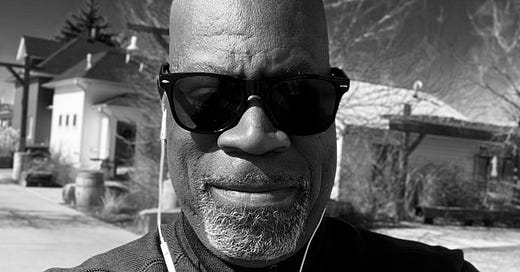Within the quiet recesses of my mind, I have often found myself wrestling with a profound lack of acknowledgment from the outer world. This feeling of being abandoned, of being ignored by the very world I seek to engage with, casts a long shadow over my existence.
As a Chocolate brotha in America, this struggle takes on layers that are complex and multifaceted, amid my attempt to weave together the threads of community, connection, and collaboration I so deeply desire with the stark reality of my experiences.
At the heart of this struggle lies a yearning for recognition—not just as a presence in the world but as a meaningful contributor to it. Yet, it often feels as though the avenues for making this contribution are blocked by invisible barriers, leaving me shouting into the void, unheard and unseen.
This experience is not unique to me; it mirrors a larger narrative that touches on race, identity, and the longing for a place where one is valued and understood.
From a philosophical standpoint, existentialists like Kierkegaard and Camus offer a lens through which to view this struggle. Kierkegaard, with his focus on individual existence and the quest for authentic selfhood, suggests that the path to overcoming despair lies in embracing one's own subjectivity. For me, this means confronting the feelings of abandonment and seeking within myself the strength to affirm my own worth in the face of external negation.
Camus, on the other hand, spoke of the absurd—the inherent disconnect between our desire for meaning and the silent indifference of the universe. In my quest for community and connection, I encounter this absurdity firsthand. The world, in its vast indifference, does not owe me acknowledgment or inclusion, yet I cannot help but seek it out.
Camus proposes rebellion as the response to the absurd: a defiant affirmation of one's values despite their apparent futility. In this light, my struggle becomes a form of rebellion, a refusal to accept invisibility as my fate.
The perspective of Ayn Rand and her protégée Nathaniel Branden offers another dimension to this exploration, particularly through their views on self-esteem. Rand, with her emphasis on rational self-interest and the moral worth of the individual, champions the idea that one's primary moral obligation is to achieve one's own happiness.
Branden, extending this idea, argues that self-esteem is the bedrock of a fulfilling life, rooted in the practices of living consciously, accepting oneself, and taking responsibility for one's actions.
For me, these ideas underscore the importance of seeking validation not from the external world but from within. They remind me that my sense of worth must be self-generated, that the acknowledgment I crave must first and foremost come from an acknowledgment of my own value as an individual.
This is not to say that the desire for community and connection is misguided, but rather that these external forms of validation are complementary to, not substitutes for, the internal validation that sustains self-esteem.
Mark Epstein, a psychotherapist and author, brings another perspective to this dialogue, particularly through his work on Buddhism and psychology. Epstein speaks to the suffering that arises from attachment and the liberation that comes with letting go.
Within the context of my struggle, this suggests a path forward that involves loosening the grip of my desires for acknowledgment and belonging. It invites me to explore the freedom that comes from detachment, not as a withdrawal from the world but as a means of engaging with it more fully, without the burden of needing it to affirm my existence.
In grappling with these philosophical perspectives, I find myself standing at the crossroads of despair and hope. The struggle with feeling unacknowledged and abandoned is, at its core, a reflection of the human condition—a manifestation of the tension between our longing for connection and the reality of our solitude.
As a Chocolate brotha in America, this tension is magnified by the societal structures that seek to define me, to limit my worth to the color of my skin or the history of my people.
Yet, in this struggle, there is also the potential for transcendence. By embracing the existentialist call to affirm my own worth in the face of absurdity, by nurturing the self-esteem that Rand and Branden advocate for, and by exploring the liberation that Epstein suggests lies in letting go, I find a path toward a deeper, more authentic engagement with the world.
It is a path marked by paradox—the acknowledgment that, even in feeling abandoned, there is a profound connection to the shared human experience of seeking and not always finding, of reaching out and not always being met.
Incorporating a Taoist perspective adds a profound layer of wisdom to the tapestry of thoughts and philosophies already explored. Taoism, with its emphasis on harmony, simplicity, and the natural flow of life, offers a serene backdrop against which the tumult of feeling unacknowledged can be viewed.
At the heart of Taoist thought is the concept of Wu Wei, or non-action, which does not imply inaction but rather taking action in accordance with the natural flow of existence.
Applying Wu Wei to my struggle suggests a path of least resistance — embracing the moments of solitude and silence not as signs of abandonment, but as opportunities to connect with the deeper rhythms of the universe.
It teaches that by aligning my actions with the Tao, the fundamental nature of reality, I can find peace and fulfillment in the unfolding of life, independent of external validation or acknowledgment.
The Tao Te Ching speaks to the virtue of being like water — soft and yielding, yet capable of overcoming the hardest obstacles. This metaphor resonates deeply with my journey, reminding me that strength lies in flexibility, in the ability to flow around the barriers of feeling unacknowledged and invisible.
Furthermore, Taoism teaches the value of simplicity and the richness of the ordinary, encouraging a reevaluation of what it means to be acknowledged. Perhaps true acknowledgment comes not from grand gestures or widespread recognition, but from the simple, everyday connections that we often overlook — a smile, a kind word, a moment of shared understanding.
In seeking community, connection, and collaboration, maybe the Taoist way is to appreciate these small moments of togetherness, to recognize that in the web of life, we are all interconnected, each of us a vital thread in the intricate pattern of existence.
Embracing a Taoist perspective, then, offers a tranquil harbor in the storm of my struggles, a place where the desire for external acknowledgment can be gently released, and where I can find solace in the knowledge that by simply being, by living in harmony with the Tao, I am already an integral part of the vast, interconnected community of life.
This realization brings with it a profound sense of peace and belonging, a reminder that even in moments of feeling abandoned, we are never truly alone, but forever a part of the flowing, ever-changing river of existence.
This journey is not an easy one. It demands courage, resilience, and a willingness to confront the deepest truths of my existence. Yet, it is through this confrontation, through the wrestling with despair and the search for meaning, that I come closer to realizing the community, connection, and collaboration I long for.
In this quest, I am reminded that, even in the face of indifference, my voice matters, my existence matters, and my contributions to the tapestry of human experience are invaluable.
The Chocolate Taoist is a reader-supported publication. To receive my weekly reflections and support my Taoistic writing, please consider becoming a paid subscriber at $6.00/month or $60.00/year.







Anything I could possibly say right now pales in comparison with the rich tapestry of philosophies you describe so eloquently in this piece and the blood, sweat, tears, and sheer determination required to somehow weave them into a fabric that is compatible with your lived experience.
So, at risk of sounding like a hollow cliché (or worse, the recent GOP response to the State of the Union!) I will simply and sincerely say that I see you. I hear you. My heart aches at the struggles you continue to face. And I’m very very glad that you are here, Diamond-Michael.
May grace and peace attend you as you face a new day.